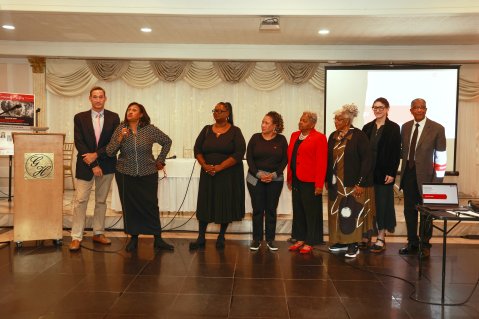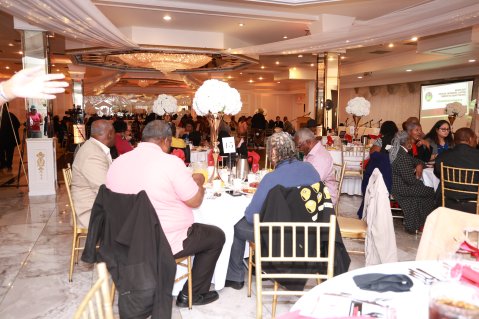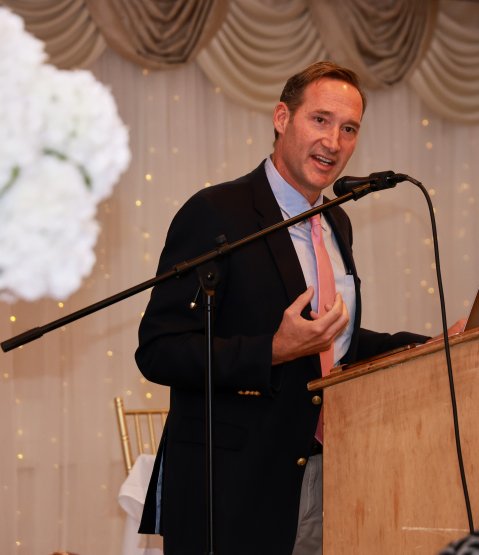Fighting Menthol and Flavored Tobacco: Rutgers IFAM Celebrates Success of Community-Engaged Research in Greater Newark
University-Community Partnership explores ways to reduce tobacco use in Black & Brown communities

The results of a two-year, community-engaged research collaboration aimed at reducing the harmful impact of menthol and flavored tobacco products (FTPs) were unveiled at “Breathe Easy: Educating, Empowering & Uniting Communities Against Menthol,” a public summit held on Oct. 17 in Union, NJ.
The initiative — The Intergenerational Fight Against Menthol (IFAM) — is led by the Rutgers Institute for Nicotine and Tobacco Studies (INTS) and the Center for Health Excellence and Community Empowerment (CHECE) at Rutgers School of Public Affairs and Administration (SPAA) in collaboration with five community-based organizations in Greater Newark. Funded by a grant from Rutgers Equity Alliance for Community Health (REACH), the project highlights how equitable partnerships between universities and communities can effectively address long-standing public health inequities.
“Menthol and flavored tobacco products remain a major public health threat,” said Kevin Schroth, JD, associate professor at the Rutgers School of Public Health. “They disproportionately harm communities of color and young people and have stalled progress in reducing tobacco-related disease and death.”

While non-menthol cigarette smoking has declined, menthol’s market share has grown from 30% to 37%, and flavored cigar sales have sharply increased — largely due to targeted industry marketing in Black and low-income communities.
IFAM was created to combat these inequities by connecting scientific research with community expertise. The initiative engaged residents through focus groups, surveys, advocacy trainings, and culturally relevant education to strengthen local capacity for tobacco prevention and cessation.
“Our work centers the lived experiences of Greater Newark residents,” said Diane Hill, PhD, CHECE co-director and assistant professor at Rutgers–Newark. “When communities co-create solutions with researchers, we build lasting trust and sustainable change.”

Partner organizations included Communities in Cooperation, Inc., East Orange Senior Services, New Hope Now Community Development Corporation, Programs for Parents, and the Township of Hillside Senior Center — each serving populations heavily impacted by menthol and flavored tobacco use.
At the summit, REACH Executive Director, Diane B. Hagerman joined CHECE’s Advocates for Healthy Living board members and Community Scientists, Dr. Mary Dawkins, Director of the Township of Hillside Senior Center and Francis J. Dixon, Executive Director of New Hope Now Community Development Corp., for a panel discussion titled, “Community Perspective, A New Paradigm for Empowering Communities.”
Hagerman discussed REACH’s mission to advance health equity and how strategies driven by community-academic partnerships can enhance local capacity and improve outcomes. Dawkins and Dixon spoke about the power of research partnerships in sustaining community programs and how their training as Community Scientists strengthened their ability to engage meaningfully with the populations they serve. Panelists also shared insights on maintaining mutually beneficial relationships between community partners and researchers.
Schroth and Dr. Ollie Ganz, assistant professor, Rutgers School of Public Health, concluded the event with an overview of the history and implications of tobacco marketing in the U.S. and shared findings from the IFAM research.
IFAM’s approach — guided by CHECE’s Transdisciplinary Intergenerational Community Engagement Model (TICEM) — demonstrates how research, policy, and community leadership can align to confront longstanding health disparities.
For more information, contact Donita Devance at devance@rutgers.edu or 732-516-8495.
About the Partners
University Partners
Rutgers Institute for Nicotine & Tobacco Studies (INTS) is a leading tobacco-focused research center aiming to reduce tobacco-related morbidity and mortality through research, treatment, policy, and training initiatives.
Center for Health Excellence and Community Empowerment (CHECE) supports public, nonprofit, and private sectors in engaging urban communities in health research, scholarship, policy, and service delivery. CHECE fosters intergenerational partnerships and community-engaged research to improve health outcomes across the lifespan.
Rutgers Equity Alliance for Community Health (REACH) focuses on improving health and quality of life in Newark, New Brunswick and Camden, NJ – three cities facing structural challenges. Funded primarily by the Robert Wood Johnson Foundation, REACH is committed to bridging community-based knowledge with rigorous university research, combining lived experience with evidence-based interventions to advance health equity.
Community Partners
Advocates for Healthy Living Initiative (AHLI) provides elders with tools and information to live healthier lives. Through base building and collaborations with community and faith-based organizations, they serve as partners in promoting health equity in the community.
Communities in Cooperation, Inc. is a nonprofit organization dedicated to empowering communities through various social services and programs aimed at enhancing the well-being of individuals and families.
East Orange Senior Volunteer Corps advocates on behalf of East Orange residents 60 years of age and older and disabled adults.
New Hope Now Community Development Corporation is the social services branch of New Hope Baptist Church (Newark). Established in 1999, NHCDC meets the social, economic, and health and wellness needs of the community.
Programs for Parents is a not-for-profit organization which works to ensure that children get the best possible start in life. They support children, families and child care providers in Essex County through advocacy and action, offering education, referrals, sharing best practices and access to available financial resources.
Township of Hillside Senior Center provides social and civic engagement to maximize independence, address basic needs, and optimize physical and mental health and well-being for adults aged 60+.
CIRTification is a free program from NJ ACTS and OUCP/CHECE that trains community members to participate in research. For more information, contact Yvette Ortiz-Beaumont at yortiz@rutgers.edu or 973-353-1181.
